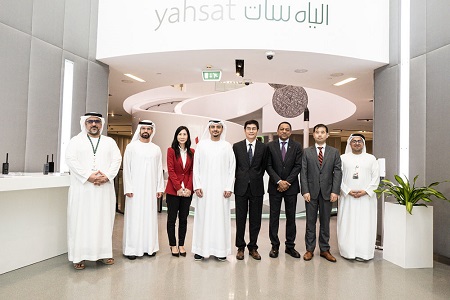Chinese embassy officials commend Yahsat for its support in the rescue of five fishermen, who were located using a Thuraya MarineStar terminal.

Yahsat and its mobility arm, Thuraya Telecommunications Company, worked closely with Chinese governmental agencies, including Chinas Embassy in the UAE and its Maritime Search and Rescue Coordination Centre (MRCC) to save a group of Chinese fishermen lost at sea.
The rescue mission underscores the significance of satellite-enabled connectivity in critical and life-threatening situations. It also underlines the importance of cross-border cooperation between Yahsat and numerous international entities, which continues to play an essential role in saving lives globally. Two senior officials from the Embassy of China in the UAE visited Yahsats headquarters in Abu Dhabi on June 15 to thank the management and staff for their timely support and explored possibilities of strengthening safety services on small boats, especially fishing vessels. Senior executives from Yahsat briefed the visiting diplomats on the numerous advantages of Thurayas satellite communications equipment.
The incident took place on May 20, when Yahsats Customer Care team received an emergency call for assistance from the Embassy of China in the UAE. The call was made on behalf of Chinas MRCC after they were alerted that a few Chinese fishermen and their boats were missing. The MRCC reached out to the Embassy to connect with Yahsat and Thuraya as the boat was equipped with a Thuraya MarineStar terminal, hence locating the boat was possible.
Ali Al Hashemi, Yahsats Group Chief Executive Officer, said: This rescue is a strong and enduring testament of the excellent relationship we as a company have with various agencies at the international level, including Chinese governmental entities. In such types of operations, quick action is imperative to locate and rescue individuals who are in danger. Fortunately, we were able to find out the whereabouts of the fishermen in time, thanks to the Thuraya MarineStar terminal installed on their boat, which allowed us to pass that information onto relevant Chinese authorities. This successful mission clearly demonstrates that Yahsats and Thurayas cutting-edge solutions are not only crucial for empowering business activities, but more importantly vital for saving lives.
Tan Junyao, First Secretary for Transport at the Embassy of China in the UAE, added: Search and rescue of lives is an international humanitarian work generally accepted worldwide. Both China and the United Arab Emirates are state parties of the International Convention on Maritime Search and Rescue formulated by the International Maritime Organization (IMO). Both countries uphold the spirit of international humanitarianism and are dedicated to reducing the loss of life at sea. Satellite communication plays a critical role in emergency response, search and rescue operations in remote waters. Yahsat provided support to MRCCs at short notice, and their timely locating the missing persons enables quick and effective international Search and Rescue coordination, thus increasing the probability of successful rescue of persons in distress. By working together in such an effective and rapid manner, we were able to protect the safety of people at sea. We look forward to exploring various ways with Yahsat to further strengthen safety awareness for small boats and thereby safeguard the lives of fishermen in the future.
The rescue mission is the second-of-its-kind involving Yahsats direct contribution in the last eight months, as seven fishermen stranded in international waters between the Philippines and Indonesia were saved in November 2022. Their boat was equipped with a Thuraya XT-LITE satellite phone, which enabled them to make a distress call.
In 2022 alone, Yahsat saved close to 130 lives through direct intervention by its Customer Care as part of the groups Save Lives campaign. This underscores the importance of equipping small boats with satellite communication gear and creating more safety awareness among operators and crew, especially in Asia, which employs 85% of the worlds fishers.















































































